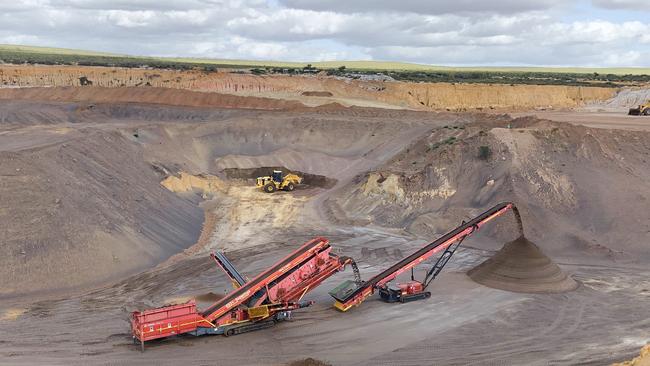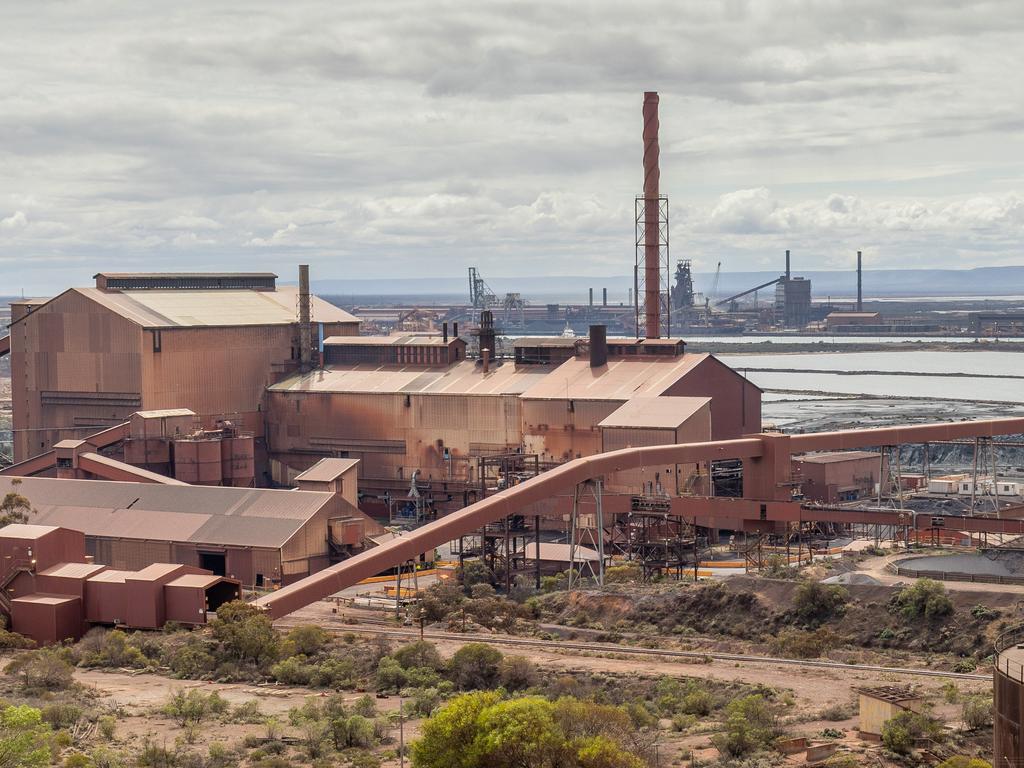Government to have power to prevent China sakes after helping finance rare earths refinery
The federal government has stumped up $400m more to help Iluka Resources build the nation’s first fully-integrated rare earths refinery.

The Albanese government will have the power to prevent sales to China after stumping up an additional $400m to help Iluka Resources complete Australia’s first fully integrated rare earths refinery.
The new funding is on top of a $1.25bn limited recourse loan from Export Finance Australia (EFA) issued to Iluka in the dying days of the Morrison government.
The deal to end a tense standoff with Iluka is subject to the company securing offtake agreements satisfactory to the government, which has already intervened several times to prevent China extending its rare earths dominance to assets in Australia.
While the offtake clause doesn’t mention China by name, it is clearly intended to ensure rare earths oxides from the WA refinery go to Western allies even if the market appears limited by a lack of downstream capacity at this point.

The Iluka share price plunged 10 per cent to $4.93 – its lowest level in more than four years – amid analyst and investor doubts about the economics of the project, which Iluka is pinning on demand growth and a new pricing mechanism involving customers in Western nations.
Prime Minister Anthony Albanese and Resources Minister Madeline King highlighted China’s dominance of the strategically important rare earths supply chain in talking about the $1.65bn funding package alongside Iluka managing director Tom O’Leary.
Asked if the government risked inflaming tension with China, Ms King said Australia had to develop independent supply chains.
“I think we need to be clear, and people need to understand, that China’s ahead of the game,” she said.
“They’ve invested in critical minerals and rare earths and solar panels and green technologies for 30 years. We need to step up and make sure we’re competing as well.”
China raised fears around rare earths supply this week by banning exports of three critical minerals to the US. The move on gallium, germanium and antimony – all used in military applications – appeared in retaliation over the latest US crackdown on China’s semiconductor industry.
The new terms of government’s increased funding agreement include a financial incentive for Iluka to source rare earths from third-parties or its own new rare earths mines.
Iluka has been in talks with government and EFA about additional funding for more than 12 months, with Mr O’Leary, threatening to stop work on the refinery at Eneabba in WA without more financial backing.
The company hailed the new government finance package as the biggest for a critical mineral project anywhere in the world.
Former defence minister Kim Beazley is among those who maintain the refinery is vital to Australia’s security and energy transition. It is also central to the government’s critical minerals ambitions and Made in Australia policy, with rare earths essential in modern weapons systems as well as in the renewables and electronics industries.
Iluka revealed earlier this year the cost of building the refinery had blown out to $1.7bn-$1.8bn after previously alerting the market the price tag was much higher than initial estimates.
The project is underpinned by a million-tonne stockpile of ore containing rare earths left over from Iluka’s mineral sands mining which is sufficient to feed the refinery until the early 2030s.
Iluka warned earlier this year it was under pressure from some shareholders to monetise a stockpile by selling it to China.
Mr O’Leary on Friday said the new funding arrangements were an “appropriate sharing of risk and the alignment of commercial and policy objectives”.
Iluka also has an offtake deal with Northern Minerals for the supply of heavy rare earths dysprosium and terbium from its Browns Range project in WA.
The Australian recently revealed the government is still investigating whether five China-linked entities have complied with an order to divest shares in Northern Minerals.
Treasury also put Chinese interests on notice it could take more action to protect national interests over the strategically important rare earths project, on top of two previous interventions by Treasurer Jim Chalmers.
Mr O’Leary on Friday repeated his fierce criticism of China’s influence over rare earths, accusing it of using the Asia Metals Index to manipulate pricing to nobble projects in Australia.
He said Iluka planned to commission the refinery in 2027 and aimed to grow with markets in the US, Europe, South Korea and Japan as they invested in capacity to produce permanent magnets and other downstream capacity to reduce reliance on China.
“There have been several incidents where there’s been a high level of uncertainty created around the supply of critical minerals from China over the last several years,” he said.
“I don’t think anybody’s thinking that we’re entering into a period of greater geopolitical calm going forward. If anything, there’s greater concern about the level of disruption.”
Iluka will contribute an additional $214m in cash to building the refinery under the new government funding deal.
Perth-headquartered Iluka said it was focused on securing “commercially-attractive supply agreements for the benefit of all stakeholders” in the refinery.
Iluka and the government also agreed to set up a $150m cost overrun facility on a 50/50 basis, with Iluka providing a guarantee over the taxpayer share.
Iluka’s original funding agreement meant it could reap an annual base royalty payment from refinery cash flows of up to $81m, capped at $900m total, ranking in equal priority to scheduled loan repayments.
Under the new deal, the royalty payment will be capped at $40m per year for the first four years if Iluka does not extend refinery feed sources beyond its stockpile.
Iluka is developing a new mineral sands-rare earths mine at Balranald in NSW intended to provide feedstock to the Eneabba refinery, and is considering a mine in the Wimmera in Victoria.
The government’s latest funding for Iluka is in addition to $800m in government loans and grants earmarked for the Gina Rinehart-backed Arafura Resources and its Nolans project in the Northern Territory.
China supplies about 85 per cent of all rare earths oxides, including 100 per cent of all heavy rare earths. Lynas Rare Earths, which operates the Mt Weld mine in WA, is the biggest non-China player and a major supplier to Japan.




To join the conversation, please log in. Don't have an account? Register
Join the conversation, you are commenting as Logout